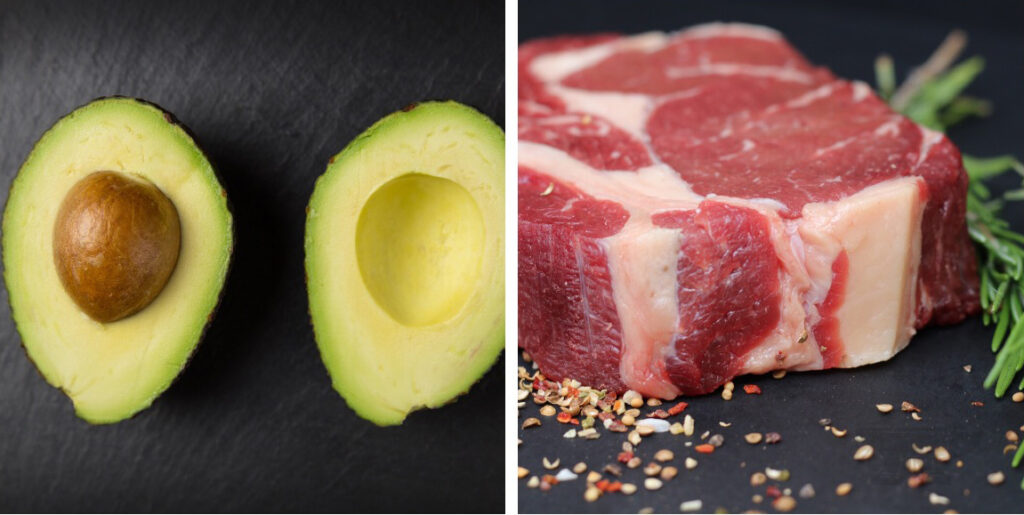There’s been a shift lately in the health industry away from villainizing fat. The new favorite bad guy is carbohydrates. We seem to be on one end of the ever-vacillating dietary pendulum, hurdling recklessly from one extreme to another, like manically indecisive squirrels in traffic.
 The truth, of course, is somewhere in the balance.
The truth, of course, is somewhere in the balance.
For a long time it was thought that, generally speaking, fat coming from animal products was a major contributor to coronary heart disease. More recent studies have shown that while there may be a small relationship there, it’s probably more minor than was previously assumed.
The more important culprit is probably excess sugar and simple carbohydrates. That’s not to say that “bad fat” is off the hook, or that carbs should always be avoided, but it’s established that replacing saturated fats with simple carbohydrates does not improve heart health.
What has been shown to improve heart health though, is replacing those “bad fats” with plant and marine based fats.
HOWEVER. This too has gotten a bit out of hand. This fat is considered “good” in the context of avoiding heart disease, not “good” like good for weight loss, morally good, or good for anything else necessarily. You don’t just eat as much as you want.
I’ve had many people triumphantly inform me of their new diets, boasting of avocados, almonds, olive oil based dressings, trail mix etc., in happy obliviousness of the sheer volume of calories they’re consuming.
“Good” fat has the same number of calories per gram that “bad” fat has, and therefore is no better for weight loss. What it’s good for is replacing “bad” fat IF you’re concerned about heart disease.
So let’s hammer this home: You still need to consume less calories than you use if you want to lose weight, regardless of what diet strategy you choose. That is true for low carb diets, keto, all-meat diets, all-twinky diets, whatever. Caloric balance is king.
It’s probably still a reasonable idea to limit the amount of fat you consume from animal products in the interest of your long term heart health, but at the same time, eating bacon now and then isn’t going to kill you.
“What if I’m healthy and fit though? Can I eat all the bacon?” Being fit and consistently active decreases your chances of heart disease significantly, but there are still risks (although less severe) associated with a poor diet, even if you’re not overweight. However these seem to be more related to sugar and alcohol than dietary fat.
In summary:
“Good fat” means good for heart health.
Good fat is not better for weight loss than “bad” fat, because the calories are the same.
As always, I hope this was helpful to everyone! Share with one of your health nut friends 🙂
STUDIES:
The Evidence for Saturated Fat and for Sugar Related to Coronary Heart Disease
“Dietary guidelines should shift focus away from reducing saturated fat, and from replacing saturated fat with carbohydrates, specifically when these carbohydrates are refined. To reduce the burden of CHD, guidelines should focus particularly on reducing intake of concentrated sugars, specifically the fructose-containing sugars like sucrose and high-fructose corn syrup in the form of ultra-processed foods and beverages.”
Dairy Fat and Risk of Cardiovascular Disease in 3 Cohorts of US Adults
Conclusion: These results suggest that replacing dairy fat with carbohydrates or other animal fat was not associated with CVD risk. However, replacing dairy fat with vegetable sources of fat was associated with a lower risk of CVD.
Saturated Fats Compared With Unsaturated Fats and Sources of Carbohydrates in Relation to Risk of Coronary Heart Disease: A Prospective Cohort Study
“Our findings indicate that unsaturated fats, especially PUFAs, and/or high-quality carbohydrates can be used to replace saturated fats to reduce CHD risk.”
“BIG SUGAR” INVOLVEMENT:
Sugar Industry and Coronary Heart Disease Research: A Historical Analysis of Internal Industry Documents
“The SRF’s funding and role was not disclosed. Together with other recent analyses of sugar industry documents, our findings suggest the industry sponsored a research program in the 1960s and 1970s that successfully cast doubt about the hazards of sucrose while promoting fat as the dietary culprit in CHD.”
WHAT IS A HEALTHY DIET?
Heart Disease and Stroke Statistics-2017 Update: A Report From the American Heart Association.
“The 2015 US Dietary Guidelines Advisory Committee recently concluded that a healthy dietary pattern is higher in vegetables, fruits, whole grains, low-fat or nonfat dairy, seafood, legumes, and nuts; moderate in alcohol (among adults); lower in red and processed meat; and low in sugar-sweetened foods and drinks and refined grains.”
Abstract MP070: Saturated Fat Intake by Food Source and Risk of Incident Coronary Heart Disease in Men: the Kuopio Ischaemic Heart Disease Risk Factor Study
Conclusions: Our results suggest an overall non-significant role for SFA intake in the CHD risk and little difference in the associations with SFA from various food sources. Because milk is the raw material in all dairy products, the inverse association with fermented dairy likely reflects other constituents in these products than SFA.
Moderate to High Levels of Cardiorespiratory Fitness Attenuate the Effects of Triglyceride to High-Density Lipoprotein Cholesterol Ratio on Coronary Heart Disease Mortality in Men
“The risk of CHD mortality in each TG:HDL-C quartile was significantly attenuated in men with moderate to high CRF compared with men with low CRF. “
Separate and combined associations of obesity and metabolic health with coronary heart disease: a pan-European case-cohort analysis
“Irrespective of BMI, metabolically unhealthy individuals had higher CHD risk than their healthy counterparts.“
Sustained Physical Activity, Not Weight Loss, Associated With Improved Survival in Coronary Heart Disease
“Sustained PA, however, was associated with substantial risk reduction.”
Histological severity and clinical outcomes of nonalcoholic fatty liver disease in nonobese patients
“Conclusion: Nonobese NAFLD patients tend to have less‐severe disease and may have a better prognosis than obese patients.”
 The truth, of course, is somewhere in the balance.
The truth, of course, is somewhere in the balance.






Keep In Touch!